Are you encountering the error Typeerror a bytes-like object is required not ‘str’?
Apparently, this error happens oftentimes in Python.
Other than that, this error occurs when we apply a function to a value that the function does not support.
In this guide, we will cover how to solve the Typeerror a bytes-like object is required not ‘str’. Apart from this, we will also give examples and a brief discussion of what and why this error occurred.
What is Typeerror a bytes-like object is required not ‘str’?
The TypeError: a bytes-like object is required, not ‘str’ error occurs when you try to pass a string (which is a Unicode object) to a function that expects a bytes-like object (which is a sequence of integers representing the binary data).
In Python, strings and bytes are two different types of data, and they cannot be used interchangeably.
Many functions in Python expect bytes-like objects as inputs, especially when working with binary data, such as reading or writing files, sending data over a network, or encrypting data.
Here is how this error occurs:
with open("file.txt", "rb") as file:
files = file.readlines()
for f in files:
if "itsourcecode" in f:
print(f)If we run the code snippet, this throws an error:
Traceback (most recent call last):
File "C:\Users\Windows\PycharmProjects\pythonProject\main.py", line 5, in <module>
if "itsourcecode" in f:
TypeError: a bytes-like object is required, not 'str'Why Python typeerror a bytes like object is required not str occurs?
This error occurs because the Python function or method that you are calling expects a “bytes-like” object as input, but you are passing a string instead.
In Python, there are two types of objects that can represent binary data: bytes and str. Wherein bytes is a sequence of raw bytes, while str is a sequence of Unicode characters.
If a function expects a bytes-like object as input, it means that it can handle binary data directly.
However, if you pass a string to such a function, Python will raise a TypeError because strings are not binary data.
So in the given example above when we ran the code it opens up the file “file.txt” and reads its contents into a variable called “files”. The “files” variable stores an iterable object consisting of each line that is in the “file.txt” file.
Next, we use a for loop to iterate over each recipe in the list.
In the for loop, we check if each line contains “itsourcecode”. If a line contains the word “itsourcecode”, that line is printed to the console. Otherwise, nothing happens.
How to fix typeerror a bytes-like object is required not ‘str’
To fix the error here are the following solution you might consider to follow.
Solution 1: Encode “str” object to byte object
The first possible way to fix the error, use str.encode function to use the str into bytes.
Since the bytes objects value on both sides is bytes objects, hence the error is fixed.
with open('file.txt', 'rb') as file:
result = file.readlines()
# call encode() on the string
if 'Hello ITSOURCECODE!'.encode('utf-8') in result[0]:
# this runs
print('Done')Here is the expected output when we run the code:
Done Solution 2: Decode the Byte Object to ‘str’
Another possible way to resolve the error is will do the opposite of what we did above. Since earlier we convert str to byte, here we will convert the byte to str.
with open('file.txt', 'rb') as file:
result = file.readlines()
# decode bytes into str
if 'Hello ITSOURCECODE!' in result[0].decode('utf-8'):
print('Success!')
Here is the expected output:
Success!
Solution 3: Typecast Byte object to ‘str’
Take a look at the example code below, on how to typecast byte type object to str.
sample = ("Hello ITSOURCECODE!").encode()
b = ("Hello")
if b in str(sample):
print("Hello ITSOURCECODE!")Here is the output when we run the code.
Hello ITSOURCECODE!
Similarly, we can convert str objects to byte objects.
See the example code below:
Sample = ("Hello ITSOURCECODE!").encode()
SampleBytes = bytes("Hello","utf-8")
if SampleBytes in Sample:
print("Welcome To ITSOURCECODE! ")Expected Output:
Welcome To ITSOURCECODE!
Solution 4: Use bytearray() constructor
We can also use the bytearray() constructor to create a mutable sequence of bytes from a string.
sample_str = "Hello, ITSOURCECODE!"
sample_bytes = bytearray(sample_str, encoding='utf-8')
print(sample_bytes)Output:
bytearray(b'Hello, ITSOURCECODE!')
Solution 5: Use io.BytesIO() class
This solution uses the io.BytesIO() class to create a new file-like object containing the bytes encoded from the string using UTF-8.
import io
sample_str = "Hello, ITSOURCECODE!"
sample_bytes = io.BytesIO(sample_str.encode('utf-8')).getvalue()
print(sample_bytes)In our example code, the getvalue() is called on the resulting bytes-like object to retrieve the bytes. Then the resulting bytes object is printed using print().
Output:
b'Hello, ITSOURCECODE!'
FAQs
In Python, a bytes-like object is any object that can be used in the same way as a bytes object. This includes actual bytes objects, as well as bytearray objects and memoryview objects.
To fix the error “expected string or bytes-like object”, you need to ensure that the input passed to the function or method is a string or bytes-like object, depending on the context.
In Python, you can convert bytes to string using the decode() method. This method is used to convert a sequence of bytes to a string using a specified character encoding.
Conclusion
In conclusion, Typeerror a bytes-like object is required not ‘str’ typically occurs when we try to interact with binary data without properly encoding it.
A typical scenario in which this error occurs is when we read a text file as a binary.
By following the solutions above you’re ready to solve the bytes-like object error like a Python pro!
We hope that this guide has helped you resolve this error and get back to coding.
If you are finding solutions to some errors you might encounter we also have Typeerror: nonetype object is not callable.
Thank you for reading!

